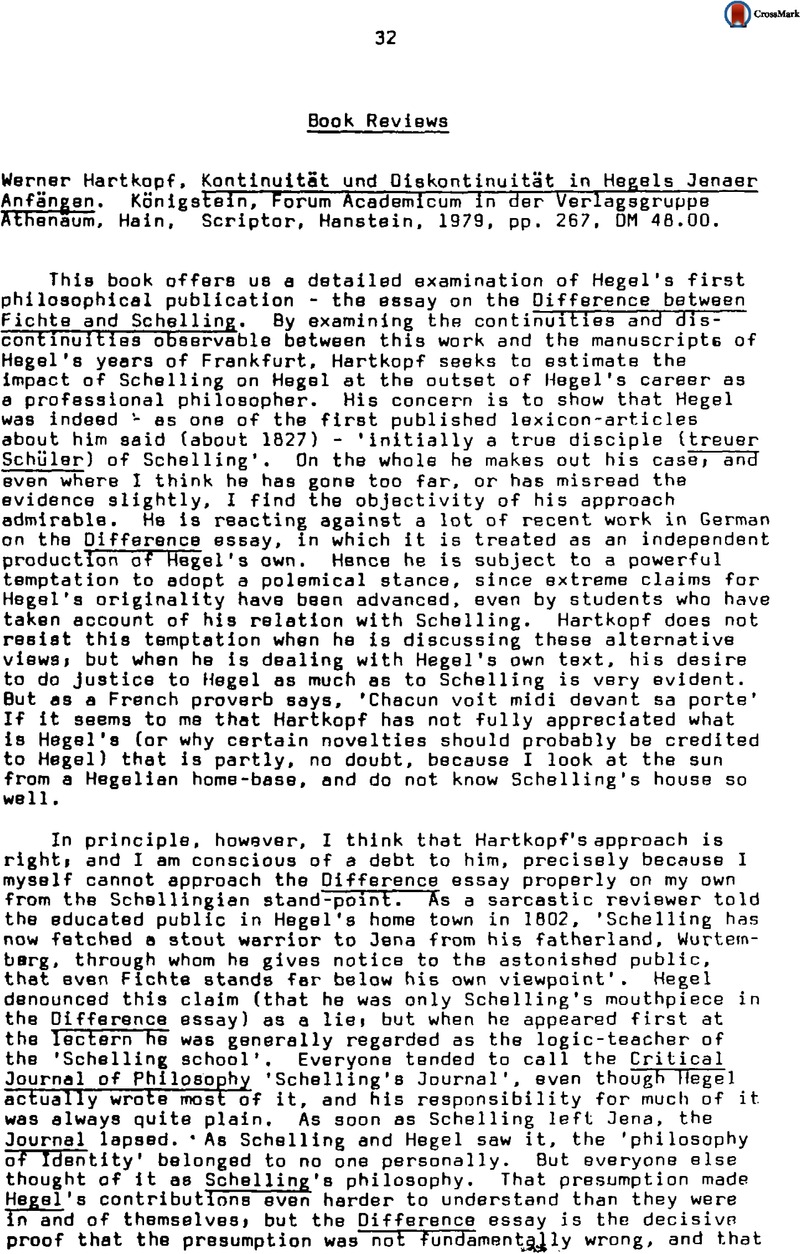No CrossRef data available.
Article contents
Werner Hartkopf, Kontinuität und Diskontinuität in Hegels Jenaer Anfängen. Königstein, Forum Academicum in der Verlagsgruppe Athenäum, Hain, Scriptor. Hanstein. 1979. pp. 267. DM 48.00.
Review products
Published online by Cambridge University Press: 23 June 2015
Abstract

- Type
- Book Reviews
- Information
- Bulletin of the Hegel Society of Great Britain , Volume 2 , Issue 2: number 4 , Autumn/Winter 1981 , pp. 32 - 36
- Copyright
- Copyright © The Hegel Society of Great Britain 1981
References
Notes
1 ‘Spekulation und Reflexion’, Hagel Studien 5, 1969, 117 Google Scholar.
2 Schelling, , System of Transcendental Idealism, (1800), translated by Heath, Peter with an Introduction by Vater, Michael. Charlottesville, University Press of Virginia, 1976 Google Scholar.
3 Hegel, , Difference between Fichte's and Schelling's System of Philosophy, translated by Harris, H.S. and Cerf, W., Albany, SUNY Press, 1977 Google Scholar.
4 See Düsing, K., ‘Das Problem der Subjektivität in Hegels Logik’, Hegel-Studien, Beiheft 15, 100–5Google Scholar, and ‘Idealistische Substanzmetaphysik’, Hegel-Studien, Beiheft 20, 1980, 25–44 Google Scholar.
5 Zimmerli, W.C., Die Frage nach der Philosophie, Bonn, Bouvier, 1974 (Hegel-Studien, Beiheft 12)Google Scholar.
6 This formulation of the point on which Hegel broke away from Schelling comes from the very first lexicon-article about him - for which Hegel himself was the probable source at least of the biographical data regarding his own development. See Nicolin, F., ‘Der erste Lexicon - Artikel über Hegel (1824)’, Hegel-Studien 7, 1972, 113–22Google Scholar (especially p. 117).
7 ‘Inwiefern wirkt Kritik Systemkonstituierbnd?’, Hegel-Studien, Beiheft 20, 1960, 102 Google Scholar.
8 See Kimmerle, H., ‘Jenaer Dokumente’, Hegel-Studien 4 1968, 81 Google Scholar and Das Problem der Abgeschlossenheit des Denkens, Bonn, Bouvier, 1970 (Hegel-Studien, Beiheft 8), 19–30 Google Scholar etc, compare my Toward the Sunlight, Oxford, Clarendon Press, 1972, 394 note 1Google Scholar. Contrast Hartkopf, p. 121 where the perpetual refrain ‘für diesen Gedanken in Hegels Frankfurter Zeiten keine Vorstufen finden’ is surely mistaken.


